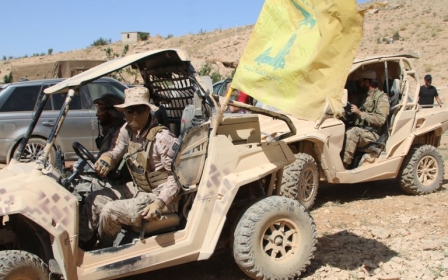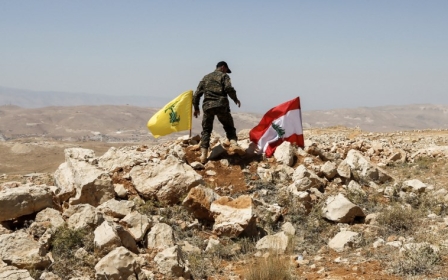Syria militants to leave Lebanon border after defeat by Hezbollah

Defeated Syrian militants have struck a deal with Hezbollah to transfer thousands of fighters and refugees from Lebanon’s border region to rebel territory in exchange for the release of Hezbollah prisoners.
Convoys of white buses arrived on Monday to shuttle Jabhat Fateh al-Sham fighters, their families and refugees out of the mountainous border region which has been the site of fighting in recent days.
The Iranian-backed Hezbollah last week launched an offensive to clear JFS, formally known as the Nusra Front, from the Jroud Arsal region.
Under a local ceasefire between the Sunni militants and the Shia Hezbollah, about 9,000 fighters and their relatives were to leave on Monday, a Hezbollah media unit said earlier.
The deal includes the departure of all JFS militants from Lebanon's border region around the town of Arsal, along with any civilians in nearby refugee camps who wish to go.
The truce echoes deals struck within Syria in which Damascus has shuttled rebels and civilians to Idlib province and other opposition areas. Such evacuations have helped President Bashar al-Assad recapture several rebel bastions over the past year.
Lebanon's Hezbollah has played a major role in fighting militants along the frontier during Syria's six-year war, sending thousands of combatants to support Assad's government.
Last week, Hezbollah took most of the mountainous zone of Jroud Arsal in a joint offensive with the Syrian army to drive JFS militants from their last frontier foothold.
Nusra Front was al-Qaeda's Syria branch until it nominally severed ties and rebranded last year. It now leads the Tahrir al-Sham Islamist alliance in the Syrian war. Its enemies still refer to it as Nusra, and reject its claims it has split from al-Qaeda.
The Lebanese army, which receives considerable US and British military support, did not take an active part in the operation, setting up defensive positions around Arsal.
The next phase is expected to target a nearby enclave currently in the hands of Islamic State militants.
Bodies of fighters exchanged
"Buses that will transport Nusra Front militants and their families have started arriving in Jroud Arsal," the military media unit run by the Iran-backed Hezbollah said via social media on Monday.
The convoys rolled in from Syria and headed towards Lebanese army positions. Syrian Red Crescent ambulances arrived on the opposite side of the frontier, the media unit said.
Footage from the border zone showed dozens of white buses driving through the barren hills. The Lebanese Red Cross has taken part in logistics.
The first step of the ceasefire, brokered by Lebanon's internal security agency, unfolded on Sunday as the two sides exchanged the bodies of dead fighters.
A Lebanese security source said 200 militants with hundreds of their family members, as well as more than 5,000 refugees, were due to leave, mostly towards insurgent-held Idlib.
JFS will release eight Hezbollah fighters under the deal, three captured in recent days and five held in Syria, a Lebanese security source said.
Hezbollah's al-Manar TV said the two sides would swap JFS militants for the Hezbollah hostages near the city of Aleppo, which the Syrian government controls.
The UN refugee agency, not involved in the deal, was trying to reach refugees in the Arsal region to evaluate whether returns were voluntary, spokeswoman Lisa Abou Khaled said.
"UNHCR believes that conditions for refugees to return in safety and dignity are not yet in place in Syria," she said, with war continuing across large swathes of the country.
The multi-sided Syrian conflict has killed hundreds of thousands of people and driven at least 11 million from their homes - about half Syria's pre-war population.
Nearly 1.5 million refugees have poured into Lebanon - around a quarter of its population - where most languish in severe poverty. Several thousand live in makeshift camps east of Arsal.
Stay informed with MEE's newsletters
Sign up to get the latest alerts, insights and analysis, starting with Turkey Unpacked
Middle East Eye delivers independent and unrivalled coverage and analysis of the Middle East, North Africa and beyond. To learn more about republishing this content and the associated fees, please fill out this form. More about MEE can be found here.





